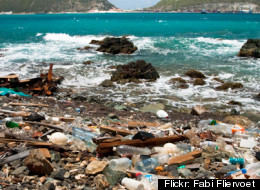 |
| Reviews and Templates for Expression We |
Ocean Pollution: Plastic Makes Up More Of The Ocean Than We Initially Thought

The cause célèbre of plastic litter in the ocean is the Texas-sized, swirling island of plastic debris thousands of miles off the coast of California in the Pacific Ocean.
But researchers from the Universities of Washington and Delaware and the Sea Education Association in Woods Hole, Mass., say the story is much bigger, and scarier, than that. They say scientists have only skimmed the surface on the devastating pollution caused by plastic debris in the ocean, and the research community is likely underestimating the amount of plastic in the ocean.
According to new research, natural ocean processes such as wind, drag, turbulence and wave height can push the plastic deep down, where it floats along, suspended underwater and unobserved by people examining the ocean's surface.
The research is published in the journal Geophysical Research Letters.
Giora Proskurowski, the University of Washington researcher, said his eureka moment happened while working on a research sailboat 2,000 miles off the West Coast.
Looking overboard, as the wind died down, he saw little white particles littered over the surface.
"It was like a photograph coming into focus," he said. As the rippled waves on the surface died, the white specks appeared.
But half an hour later, as the wind picked it up, they all disappeared.
He decided to take samples from below the surface, at a depth of 16 feet. And there, he discovered plastic moving through the water column, even though he couldn't see it on the surface.
Taking the experiment a step further, Proskurowski looked at data that had been collected by the Sea Education Association from the 1990s and early 2000s. He also collected more samples from the North Atlantic at different depths, going down as far as 100 feet.
“Almost every tow we did contained plastic, regardless of the depth,” he said.
Using that data with wind measurements that had been collected, Proskurowski and his team were able to devise a simple model that can potentially be used by others, including non-scientists, to match wind data with surface plastic collections to estimate how much was missed by only skimming the surface.
"In order to make an accurate estimate, you need to consider the wind conditions under which that sample was taken," he said.
The team is hoping others will use this model – which is available upon request – to evaluate current investigations of plastic pollution in the ocean.
"I think what this research really shows is that I can go out in the middle of the ocean – five days away from land – into one of the remotest parts of the planet, and scoop up plastic," he said. "I think it's a stark reminder of the impact our society has on the planet."
"And it should make us realize that any systematic cleanup approach we might make is going to be difficult," he said.
The American Chemistry Council, the chemical and plastics industry trade group, could not be reached for comment.
Capt. Charles Moore of the Algalita Marine Research Foundation in Long Beach said the research supports the work his own organization has done, which also has found that plastic sinks in the water column and its presence is underestimated.
"I'd suggest they start analyzing the sediments of the mouths of urban rivers," where plastics heavier than water get mixed in with soils, Moore said.
Moore said the presence of plastic in the ocean is concerning for a variety of reasons. His foundation has discovered that reef-like structures are forming on the plastic, with crabs, sea anemones, barnacles and even coral heads living on the plastic jetsam floating in the ocean. These reefs alter the deep ocean by blocking sunlight and alter the ocean's chemistry.
He said the plastics also are toxic, and as animals feed on them, these pollutants enter the food chain, carrying and amplifying them as animal after animal is exposed.
"Then there's just the straight ingestion issue," he said, with evidence that whales, turtles and fish are filled with these plastics.
"I wish there were a simple answer to fixing this," he said. "But our economy is based on throwaway, packaged items."
|
|
|
|
Copyright 2011 Energy and Technical Services Ltd. All Rights Reserved. Energyts.com |